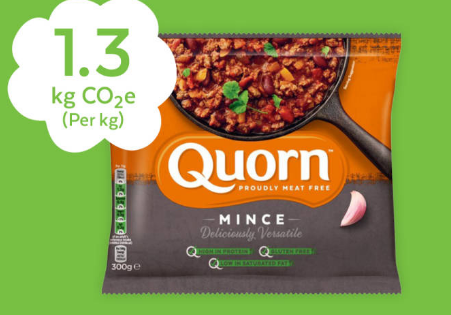Quorn is trying to be as sustainable as possible and continually sets and meets goals in order to do so. They have hit a few of their targets already, including:
- Reducing the carbon footprint of their factories by 33%
- 80% of their packaging is now recyclable
- Reducing water usage by 21%
- 100% of cardboard used is from sustainable sources
- 99% of palm oil used is sourced through Roundtable for Responsible Palm Oil (RSPO)
- Member of Roundtable for Responsible Soy (RTRS)
Quorn is the first global meat alternative brand to achieve third-party certification of its carbon footprint figures. Quorn is Carbon Trust certified.
Is Quorn environmentally friendly?
As far as carbon emissions go, Quorn is putting in a great effort to reach its goal of having net zero emissions.
Including:
- Acquiring third-party accreditation from Carbon Trust
- Low carbon footprint compared to meat products
- Because they ferment the main protein sources, mycoprotein, their carbon sources are low and so are their land and water requirements
- In 2018 alone, Quorn saved 200,000 tonnes of C02 compared to meat equivalents
- Greenhouse gas impact of mycoprotein is 90% lower than meat
Does Quorn use sustainable palm oil?
Yes, Quorn uses sustainable palm oil. They are members of the Roundtable on Sustainable Palm Oil (RSPO). Since 2014, they have used only sustainable palm oil.
What is Quorn?
Quorn is a meat substitute product originating in the UK and sold primarily in Europe.
So if you’re American, or Canadian like me, and you have never heard of Quorn before, don’t feel too bad. It’s probably not sold at your local grocery store.
All Quorn foods contain mycoprotein which is derived from fungus. The dried fungus culture is dried and mixed with either egg albumin or potato protein (vegan formula) that acts as a binder, then texture is adjusted and the mixture is pressed into various forms. MMM…sounds delish!
How is Quorn made?
Forgive me, I had to delve into Wikipedia for this answer:
Quorn is made from the soil mould Fusarium venenatum.
The fungus is grown in continually oxygenated water in large, otherwise sterile fermentation tanks. Glucose and fixed nitrogen are added as a food for the fungus, as are vitamins and minerals to improve the food value of the product. The resulting mycoprotein is then extracted and heat-treated to remove excess levels of RNA.
The product is dried and mixed with egg albumen, which acts as a binder. It is then textured, giving it some of the grained character of meat, and pressed into a mince resembling ground beef; forms resembling chicken breasts, meatballs, and turkey roasts; or chunks resembling diced chicken breast.
The final Quorn product is high in protein and dietary fibre and is low in saturated fat. It contains less dietary iron than most meats and the manufacturers have not released much information about additives they use to make Quorn resemble meat.
Can you get food poisoning from Quorn?
Quorn CEO Kevin Brennan, claims,
We have sold about 4bn Quorn products over 30 years and we know the safety record of the product is exceptional. Any form of reaction is exceptionally rare, perhaps one in 150,000.
He says Quorn is:
as benign as a potato.
However, it should be noted that there is currently a class action case against Quorn brought on by the Center for Science in the Public Interest (CSPI) calling for all Quorn products to be labeled “Mycoprotein is a mold [member of the fungi family]. There have been rare cases of allergic reactions to products that contain mycoprotein.”
This was brought on because some consumers are sensitive to Quorn products, resulting in vomiting, nausea, diarrhea, and, less often, hives and potentially fatal anaphylactic reactions.
Is Quorn healthy?
At the end of the day, Quorn is a processed product. You are better off sticking to the minimally processed Quorn products such as the basic Quorn mince or pieces, rather than the battered replica fish, for example.
Eating Quorn from time to time is OK, but try to stick with clean protein sources over processed for the majority of your meals.
Well, this was certainly an eye-opening article on Quorn, at least from my point of view, having never heard of it until a few hours ago!
Overall, I really like what the company is doing to become more and more sustainable. It takes time and effort to evoke change and I believe that Quorn is putting in that time and effort.
If you are looking for a meat-alternative for the occasional meal here and there, I think Quorn is a good choice.
Have you ever eaten any Quorn products? What was your experience with them? Do you think Quorn is a sustainable company? Let me know in the comments below.
Cheers, and have an awesome day!








We have been using Quorn as an alternative to Beef mince for cottage pie or Chilli-con-carne for years and I honestly find it a brilliant alternative. The texture is very authentic and when cooked up with onions, tinned tomatoes, tomato puree and gravy stock the taste is great.